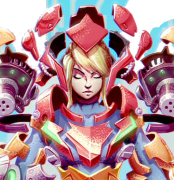|
New-page doublepost, whoops
Malcolm fucked around with this message at 10:52 on Oct 7, 2014 |
|
|
|

|
| # ? May 14, 2024 15:24 |
|
CR already is a way to express "is worth an amount of xp" and "is this dangerous", so why not drop XP entierly, say you need x CRs to level up and balance CR from there?
|
|
|
|
30.5 Days posted:A situation with no narrative conflict isn't an encounter of any sort, so no XP award is appropriate. I guess I don't disagree that awarding more XP for more difficult encounters is arbitrary, but it's just as arbitrary to award twice as much XP for twice as many monsters. Not sure why you draw the line at three times as much XP for twice as many monsters, especially when the encounter is three times as difficult. It is certainly all arbitrary, I'm just trying to make sense of it all in the framework of D&D as someone that hasn't run very many games. It seems illogical to me that killing the first of 400 kobolds would give more experience than a single kobold. What is it about the fact that you are outnumbered that makes the mechanical act of running a sword through a kobold more rewarding? If I'm attempting to powerlift 400lbs, does it matter whether I'm in the gym, or lifting a cursed obsidian door in a dungeon? Based on posts here, yes; context is everything and XP is merely a function of risk vs reward.
|
|
|
|
XP is an abstract game mechanic, of course it's going to fall apart when you try applying real world logic to it.
|
|
|
|
Malcolm posted:Why? Does one Orc not give a standard amount of XP? If I tie my shoelaces one-handed while suspended upside-down over a volcano... do I get a massive XP bonus? The problem with 1 monster = 100 XP, 4 monsters in an encounter = 400 XP is that the second encounter is far more difficult than encountering one monster, then one monster, then one monster, then one monster. The clue is right there in the mechanic for this - the Challenge Rating is how you measure how challenging an encounter is, and higher Challenge Rating monsters give more XP. More challenging encounters give more XP - fighting a demon gives more XP than fighting a dog. It's just at the last gasp the designers brains gave up and they decided that they would opt-out of that particular metric, so you now get the same XP for fighting two dogs at once as you do for fighting two dogs with a two-week rest between each one, even though those are CLEARLY challenges of different rating. There's no need for a "gut check" to determine encounter difficulty - 5e clearly has a system for doing that already. The "insanity" comes in when you don't reward your players more for tackling more difficult encounters. You wouldn't give the same XP for fighting a demon as you would for fighting a dog just because they're both monsters, would you? Malcolm posted:edit: My point is that any task can be made arbitrarily difficult, and awarding experience based merely on "chance of death" seems misplaced. I prefer a system where overcoming an obstacle results in a defined amount of experience gained. It shouldn't matter if the pit trap is located in the dragon's inner sanctum, or in the level 1 gnolls' filthy warren. The location of the pit trap is irrelevant - it's still a CR 1 encounter or whatever. The difference in our thinking is that I think that tackling the pit trap while under attack by the dragon should grant a total experience gain of a larger amount than tackling the pit trap, resting for an hour, then fighting the dragon. Here's an example to illustrate, with made-up numbers: Pit trap: 100 XP Dragon: 10,000 XP Your system: Dragon, rest, pit trap: 10,100 XP Dragon and pit trap in same encounter: 10,100 XP My system: Dragon, rest, pit trap: 10,100 XP Dragon and pit trap in same encounter: 11,000 XP A more challenging encounter should give you more XP than tackling the elements of that encounter separately, as this is effectively a less challenging encounter, since you can rest between sections, focus fire on one thing at a time, and so on.
|
|
|
|
The Real Foogla posted:CR already is a way to express "is worth an amount of xp" and "is this dangerous", so why not drop XP entierly, say you need x CRs to level up and balance CR from there? The first TTRPG I played did something like this: Microlite20 posted:Encounter Level = Hit Dice of defeated monsters, or the given EL for the trap, situation, etc.
|
|
|
|
Good posts, I will mull it over while I prep for my upcoming campaign. Thanks all.
|
|
|
|
Malcolm posted:Good posts, I will mull it over while I prep for my upcoming campaign. Thanks all. If you want serious advice, don't use XP at all. Just let the players level up at appropriate times.
|
|
|
|
Andrast posted:If you want serious advice, don't use XP at all. Just let the players level up at appropriate times. This is my advice as well. XP's an outdated, pointless mechanic. Level up when you feel the players need some new abilities to keep the game interesting, or when you want to throw some tougher monsters in there, that kind of thing. Certainly don't do the thing where because Bob missed last week's session, Grimthar the Barbarian is level 1 when everyone else is level 2. That poo poo is the worst.
|
|
|
|
gradenko_2000 posted:The first TTRPG I played did something like this: Babylon Astronaut fucked around with this message at 11:34 on Oct 7, 2014 |
|
|
|
Gort posted:This is my advice as well. XP's an outdated, pointless mechanic. Level up when you feel the players need some new abilities to keep the game interesting, or when you want to throw some tougher monsters in there, that kind of thing. As I said before, I 100% agree with this. When we made the switch to doing it in our game it was a revelation. Also for sure keep everyone at the same level, level differences make it even harder to balance encounters. In the example you gave, Malcom, don't give the bard a personal reward of 100xp for conning the barkeep - the stuff he got for the con should be reward enough.
|
|
|
|
Disagree. Your players will feel like you arbitrarily decided to level them up, rather than they earned it. XP is a reward just like treasure, players like getting it and saying "Oh man just 300 more and I can deflect arrows!" or whatever, same as "I can almost afford that magic armor!"
|
|
|
|
greatn posted:Disagree. Your players will feel like you arbitrarily decided to level them up, rather than they earned it. XP is a reward just like treasure, players like getting it and saying "Oh man just 300 more and I can deflect arrows!" or whatever, same as "I can almost afford that magic armor!" Perhaps your players do feel that way, but I wouldn't make statements like that about other people's players. Mine are absolutely fine with leveling up when I tell them to, as it tends to be after an adventure or two, meaning they both earned it and it happens during a natural lull in the action. (Depending on the game and edition of course. If for some reason I were to run AD&D then I couldn't really hand out equal levels.)
|
|
|
|
Yeah, the less bookkeeping I have to do, the better. I was really happy when our 4e group switched over to leveling when narratively appropriate. Now if only there was an easy way to do the same thing with treasure packets...
|
|
|
|
greatn posted:Disagree. Your players will feel like you arbitrarily decided to level them up, rather than they earned it. XP is a reward just like treasure, players like getting it and saying "Oh man just 300 more and I can deflect arrows!" or whatever, same as "I can almost afford that magic armor!" Adventure milestones are just as rewarding as flat xp/gp bonuses. I can't imagine someone would be upset at "You kill the last hobgoblin in the temple. After defending the temple for days, you may rest and level up" over "You kill the last hobgoblin in the temple. That puts you just over 2000 xp, so you can rest and level up." Edit: ^ as mentioned, it's less bookkeeping to do the former for the DM. I don't have to nit-pick about going over or under the XP limit for each encounter, and the players still have fun and level up as appropriate. Heck, if I leveled up my players as appropriate in the RHoD campaign I ran, they would have been level 11 before they hit the halfway mark (the entire campaign runs from 6-12). IT BEGINS fucked around with this message at 15:18 on Oct 7, 2014 |
|
|
|
I've never played with a player who bean-counts XP, and that's with an embarrassing number of years /played. It's seriously the most tedious, boring score to track - the closest I've ever come is when someone asks if we're close to leveling, and then I pretend I've been keeping score and "Oh yeah! You'll all be Level+1 next session."
|
|
|
|
e: Oops, quote/edit.
Jack the Lad fucked around with this message at 15:55 on Oct 7, 2014 |
|
|
|
greatn posted:Dragons have helium sacs and birdlike bones, the world is much more oxygen rich allowing the survival of large insects and dinosaurs, giant humanoids have springy bones, invisible creatures are not really invisible it is an illusion and mind trick, hit points are an absteaction it turns out that chest wound was merely a graze lucky you. Jack the Lad posted:If you puncture a dragon's helium sacs can it still fly? Also: greatn posted:Disagree. Your players will feel like you arbitrarily decided to level them up, rather than they earned it. XP is a reward just like treasure, players like getting it and saying "Oh man just 300 more and I can deflect arrows!" or whatever, same as "I can almost afford that magic armor!" What exactly constitutes earning your level-up? Jack the Lad fucked around with this message at 16:10 on Oct 7, 2014 |
|
|
|
I also would like to argue with the person who said D&D 4E only has one class. It will be fun and and informative for all involved. Seriously though, nearly every group I'ver ran games has expected me to keep up with their XP for them. It got to the point that I always ask people if they want to actually track XP or wing it and "wing it" wins the vote every time. OctoberCountry fucked around with this message at 15:23 on Oct 7, 2014 |
|
|
|
I've never seen XP used for anything other than encounter budget (excepting certain games like DW and Dark Dungeons). We just kinda gauged when we were gonna level based on things like # of encounters & such.
|
|
|
|
I'd say, as with a lot of DM advice, it's less "don't do this" and more "if you do this, here are complications you should know about." Someone who falls behind a level, particularly in the early ones, tends to only fall further behind. It's the difference between adding a very difficult encounter to an adventure, and *accidentally* doing so because you misread an ability or something.
|
|
|
|
Malcolm posted:It is certainly all arbitrary, I'm just trying to make sense of it all in the framework of D&D as someone that hasn't run very many games. It seems illogical to me that killing the first of 400 kobolds would give more experience than a single kobold. What is it about the fact that you are outnumbered that makes the mechanical act of running a sword through a kobold more rewarding? If I'm attempting to powerlift 400lbs, does it matter whether I'm in the gym, or lifting a cursed obsidian door in a dungeon? Based on posts here, yes; context is everything and XP is merely a function of risk vs reward.
|
|
|
|
greatn posted:Disagree. Your players will feel like you arbitrarily decided to level them up, rather than they earned it. XP is a reward just like treasure, players like getting it and saying "Oh man just 300 more and I can deflect arrows!" or whatever, same as "I can almost afford that magic armor!" In a sane hobby where people practice good consumer habits, the fun is entirely "earned" at the point of sale, with no arbitrary extra obstacles in place for no better reason than inertia.
|
|
|
|
A note on exp: I actually have a bean counter in my Dark Sun game. He always asks how much exp we got and would feel gypped if I did it the "GM says you level up now" method. I myself enjoy keeping track of exp, actually, but mostly because I like to estimate how far away we are to next level. When you're in the GM chair you can chuck exp out the window though, and none would notice... except for those people who would notice. However, there's a catch. You see, this too is a reflection on how well constructed a game's encounter building rules are! In 4E, the exp guidelines are streamlined and built into the encounters themselves. So you, the GM, ALREADY KNOW how many encounters it would take to level the party. You can go ahead and stop tracking exp because guess what? You already have it written down before you even place your first monster on the board! Basically, I already know when the players will level up and I've been noting exp to the players simply as a formality and so that the one player feels like he accomplished something. You can certainly do the same for 5E, as that too is already built into encounter design and the Adventuring Day, but this is where it catches a snag and you realise just how slowly players are expected to level up in 5E. It flat out tells you that approximately 1/3 of the level experience is an expected Adventuring Day... which is 6 encounters. Therefore, you can say "Okay, so basically 18 encounters of the party's level nets them a level". But... That's ridiculous. 18? Really? And as far as I can tell the only way you're expected to dole out exp in 5E is through combat encounters. This means the party is expected, RAW, to fight 18 sets of dudes before they can level up. Now, sure, you can give story rewards, and I'm sure they'll have rules for that in the published DMG because I'm hoping the designers aren't THAT stupid, but still. That means maybe, what, an entire adventuring day's worth of exp (6 encounters) is ad hoc? Why have the exp system at all if it's going to be that loosey goosey?
|
|
|
|
greatn posted:Disagree. Your players will feel like you arbitrarily decided to level them up, rather than they earned it. XP is a reward just like treasure, players like getting it and saying "Oh man just 300 more and I can deflect arrows!" or whatever, same as "I can almost afford that magic armor!" I think I might be biased because I run horror, hexcrawls, and megadungeons so survival is an end to itself, and there absolutely cannot be any reason to go grind weak monsters at a lower dungeon level or the game is ruined. I've held a party that had enough xp to get to epic at level 12 for months on end and not only did no one complain, they volunteered to go back several levels because it was more fun with simpler characters, more iconic monsters, and no combat invalidating bullshit. I'm also biased because D&D has XP that is difficult to track, given out arbitrarily (quest xp, roleplaying bonus xp, mapping xp, good attendance xp), and in most editions the game stops working at higher levels. Look at it this way, if they want to feel like they earned new abilities and that's what's driving them, then give them more abilities. You can give them better equipment that lets them attempt new things, you can give them equipment that lets them do what they currently do better, you can let them earn non-equipment rewards like estates and titles, they can quest for training or spells. All of these things are way more exciting than giving them math homework.
|
|
|
|
I think tracked XP vs. milestones is a moot point. There are upsides and downsides to each that pretty nearly reflect each other: Tracked: Upside - You can grant extra rewards when your players exceed roleplay expectations during important moments or decisions, or get a "best case" resolution to some scenario you put in front of them, etc. This allows them to advance a little early but more importantly it bestows a tangible reward so their above and beyond efforts don't get ignored. Drawback to be aware of - They could get ahead of your planned material and/or try to cheese it MMO-style by grinding out easier encounters. To counter, you have to either guide their actions a little more or be prepared to retune planned material, but now you risk railroading the plot or overburdening yourself with retuning. Unavoidable Downside - It's fiddly and often imprecise math that the DM has to constantly keep up with. Milestone: Upside - Clean, easy, no fuss, and the level-ups will always come at a narratively fitting moment. Drawback to be aware of - The low granularity of advancement means when the party goes above and beyond they likely won't see any sort of reward for it. To counter, you can offer up other tangibles like more loot or a new NPC that can help them, but now you risk over-burdening your planning sessions with all these possible extras. Unavoidable Downside - The ratio of character activity to level gain can feel inconsistent, arbitrary, and wholly outside the player's control. There is no objectively correct answer, just talk to your group, consider the campaign you're starting, etc. and figure out what will work best. Me, personally, I just collect the numbers as they go and dole it out at narratively appropriate points. Bhaal fucked around with this message at 16:24 on Oct 7, 2014 |
|
|
|
Gort posted:The problem with 1 monster = 100 XP, 4 monsters in an encounter = 400 XP is that the second encounter is far more difficult than encountering one monster, then one monster, then one monster, then one monster. You can't predict the challenge for an encounter by qualitative means. You have to treat enemies, traps, or groups as atoms and let the DM or players decide what the bonus XP should be, if any. There are too many variables that can be missed and too many open-ended solutions which may or may not met everyone's definition of challenge.
|
|
|
|
Bhaal posted:Unavoidable Downside - The ratio of character activity to level gain can feel inconsistent, arbitrary, and wholly outside the player's control. How is it an "unavoidable downside" if it only can feel inconsistent, etc? Surely if there's uncertainty over whether it happens or not it's only a possible downside. I also have never experienced a player who felt badly about not having to track XP. My games tend to level up at breakneck pace compared to what the guidelines in the book say - I usually do it each adventure or couple of adventures - 45 encounters sounds like plenty for the lifetime of a player character to me, and it's nice to see the characters evolving quickly. temple posted:That comes off as a railroad. It's not a railroad at all. You calculate awarded XP after the battle(s) are done. So if you do some stuff and happen to encounter the orcs one at a time, here's your four lots of 100 XP for four super-easy encounters. If you do some other stuff and happen to encounter the orcs all at once, here's your one lot of 600 XP for one hard encounter. No railroading at all. Also "You can't predict the challenge for an encounter by qualitative means"? Isn't this exactly what the challenge rating does/attempts to do? Or the XP system? Or that multiplier that increases or decreases the XP of an encounter based on its quantity of enemies? Your post seems really handwavy and "Oh, nobody can ever know anything for SURE" for something as simple as "fighting guys one at a time is easier than fighting lots of guys at once". Gort fucked around with this message at 16:34 on Oct 7, 2014 |
|
|
|
Bhaal posted:Unavoidable Downside - The ratio of character activity to level gain can feel inconsistent, arbitrary, and wholly outside the player's control. - Someone not talking about the 5th ed encounter design/XP allocation mechanics
|
|
|
|
Is it harder to move 50 ten-pound cinder blocks over the of a weekend, or to move 500 pounds in one trip? Are three hornets in a field more dangerous than three hornets in the cockpit of your plane during a dogfight?temple posted:That comes off as a railroad. I don't think you understand what railroading is. And you can absolutely predict if factors are going to make an encounter more or less dangerous. The worst swingy unpredictability enters when you start introducing Cast 2 Win mechanics that trivialize encounters (Thanks, Next!) and factors that were supposed to be challenging aren't. The quick answer is to post-facto apply XP based on how challenging the encounter actually was instead of how difficult it was supposed to be. Just assigning 100XP to Kobolds is worthless in a vacuum.
|
|
|
|
In the age of the computer/tablet/roll20/whatever it's not really hard to track down exp, even if you have to do it per player, and even if we were to go back to the days of different xp requirements per class/race, if you really wanted to. What I think the Next-specific problem is, is that the game already acknowledges that there is a way to qualitatively measure the difference between four one-Orc encounters and one four-Orc encounter, but then refuses to give any of that back to the players. EDIT: The other layer of the problem being that the CR categorization of the monsters is hosed, which means even if the game did award more experience for the four-Orc encounter, that's still as arbitrary as anything else! It would have been fine if the game just let this all go unmentioned, but the fact that they made a system for it, a system that then sucks and would be easier if it were just ignored altogether, sucks. gradenko_2000 fucked around with this message at 17:16 on Oct 7, 2014 |
|
|
|
Boing posted:- Someone not talking about the 5th ed encounter design/XP allocation mechanics Both are valid ways to go. The people, the style of play, the focus (or lack) on narrative pacing in the campaign, all factor in to make the comparison completely situational.
|
|
|
|
Gort posted:Your post seems really handwavy and "Oh, nobody can ever know anything for SURE" for something as simple as "fighting guys one at a time is easier than fighting lots of guys at once". I called it railroading and that is probably a poor choice of words. I meant more in the context of a DM or game builder that wants to create scenarios that are challenging and rewarding. Your "groups = more XP" idea would be limiting if anyone held fast to that idea. CR is just a guide at the planning or the rewards stage. temple fucked around with this message at 20:37 on Oct 7, 2014 |
|
|
|
greatn posted:Disagree. Your players will feel like you arbitrarily decided to level them up, rather than they earned it. XP is a reward just like treasure, players like getting it and saying "Oh man just 300 more and I can deflect arrows!" or whatever, same as "I can almost afford that magic armor!" The GM deciding when to level up is no more arbitrary than the XP gates at which you level up. It's the exact same thing.
|
|
|
|
S.J. posted:The GM deciding when to level up is no more arbitrary than the XP gates at which you level up. It's the exact same thing.
|
|
|
|
Malcolm posted:I agree with you that it is a memorable experience, but the level of effort isn't any different. I think this is heading towards a philosophical argument of whether XP should be awarded based on danger, or based on the mechanics based situation. It boils down to a question of whether or not experience is a game mechanic that tracks your character learning by doing dangerous things; doing very dangerous things will give you more experience, doing trivial things not so much but if you do it a bunch then maybe the practice will pay off. The alternate view is that experience is something inherent to the game world, little floating green orbs that dead monsters and disabled traps vomit out when they're defeated and you collect enough of to magically power up. The first view tends to be much more supported than the second, given that things like quest rewards don't make a whole lot of sense unless the person who gave you the quest is handing you a packet of blackmarket experience orbs. The second view is how you get things like "I don't want to start the campaign at level higher than 1, but look - an elder red dragon just crashed to the ground in front of you, unconscious. You've Coup de Graced it and killed it, and are now all level 8!" Of course you get more experience doing more dangerous things in more dangerous situations. Tons of basketball players can sink free throws almost all the time in calm and relaxed practice, but in the middle of a game where you've been working hard the percentages are going to drop considerably; yes, throwing Rock, Paper, Dragon (paper means 'scroll' in D&D) in an inn is not going to be nearly as stressful as trying it with an ancient and powerful creature who will kill you if you fail. Context matters.
|
|
|
|
Bhaal posted:
This right here is the correct answer. Find out what your group wants and expects. It's not going to really inconvenience you that much because you're the GM, after all, and in a well designed system tracking exp shouldn't even BE any trouble for you or your players.
|
|
|
|
Every now and then people say I go to far when I talk about D&D actually hurting people, and then someone talks about experience points being an actual physical thing that needs to be given realistic attributes and all I can d is point at that and make funny faces.
|
|
|
|
Yeah, you silly people quantifying intangible, made up abstractions just for a game universe. "Hit Points"? "Levels"?
|
|
|
|

|
| # ? May 14, 2024 15:24 |
|
temple posted:If you face 4 solo orcs at the start of the adventure vs 4 at the end would change the challenge factor of the encounter. In a sense, this was already factored in ages ago with higher levels requiring higher amounts of XP to progress. That is to say, killing forty orcs might get you from level 5 to 6, but it might take sixty to get to 7. So adventurers would organically seek out progressively greater challenges to test their mettle against.
|
|
|

































